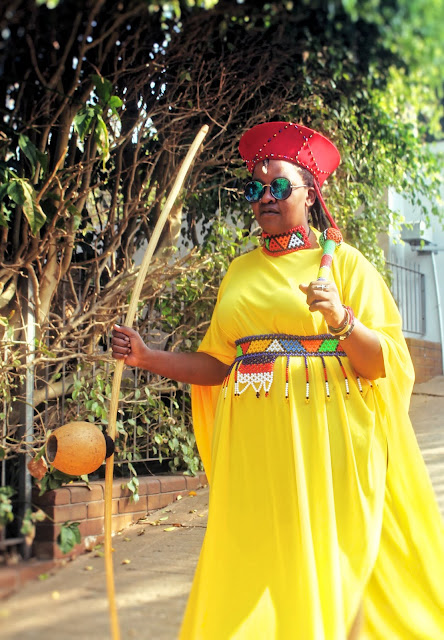In the previous post we introduced meditation as an integral part of African culture. In this post Thobekile delves a little deeper to share more of her perspective on meditation...
My life has led me to a place where I actively work on the promotion, preservation and development of indigenous music and instruments. This primary role has expanded my knowledge of African cultural practices such as moon rituals, ukuphahla, keeping umsamo (alter) and our connectivity with nature.
Since we as African people around the globe, through brainwashing, symbolism and repetition, were forced to leave behind ancient teachings in favour of western religions which disconnected science and spirituality, we now think that studying spirituality is a matter of faith, while studying science is a matter of fact. However, our ancestors understood that science is spirituality that is seen and spirituality is science that is unseen. The truth is that the body is just one expression of the soul. And in the same way that human anatomy is made up of parts that work together here on earth, you have a spiritual anatomy that connects the seen with the unseen and operates in the divine realm. Through meditation we are able to make these connections and recognize the truth that we are all connected with all there is that vibrates life. These are the connections we should not lose sight of as Africans in a modern world filled with endless distractions.
Within our African culture, like all other indigenous cultures of the world, we have always known that we are an extension of nature. African belief systems are not monotheistic; they include cosmology, science, medicine and healing, art, psychology and philosophy, amongst other things, which are integrated into a holistic system of thought. We have always acknowledged the relationship of the seen and the unseen - the duality of being. We understand that nature is all powerful (omnipotent). We know that nature is all knowing (omniscient). For instance, the way in which seasons change show nature’s inherent intelligence. Lastly, the evidence of nature is everywhere (omnipresent). Nature is the basis of African Spirituality. It is our archetype for the way we conceptualise God or Life Force. African Spirituality is a system that allows us to draw in inherent power as opposed to looking for a saviour; empowered versus empowering. For me, the greatest physical evidence of our connectivity to nature is that when we die we go back to the body (earth). Another example is in seeing nature as the ultimate creator because nature takes care of all our needs for sustenance, shelter and medicine.
When asked about why I meditate and the purpose of meditation, I often refer to a quote from Buddha, who was asked “...what have you gained from meditation?” and to which he replied, “Nothing. However let me tell you what I lost; anger, anxiety, depression, insecurity, fear of old age and death”. For me, meditation is about connecting and manifesting. When we speak about connecting it is about the undisturbed trust you have for your inner voice. When you trust your inner voice you can avoid situations or you can align with a great opportunity. For instance, many people who have been interviewed after they were mugged often cite that they felt something was wrong or that they should not walk in a certain direction. Manifesting relates to bringing to fruition the thing you desire in a miraculous way. For example, I was once asked to perform one song at a gig. I charged R500 for that performance. My mantra at that time was; “I manifest large sums of money easily and effortlessly”. In the end I was paid R5000 for that performance.
After learning as much as I could about meditation techniques from various indigenous cultures and religions, I recognise that when I obtain more knowledge, I am able to grow and become more open. I believe the reason there are different types of meditation is that they differ in their intention. I find that vipassana meditation (which means to see things as they really are) offers the clarity I want in my life and covers many aspects, even though from time to time I will do visualisation meditation. Vipassana meditation is also known as sensory or thought-watching meditation. It is a way of self-transformation through self-observation.
I encourage people to explore meditation for themselves; to really interrogate the different forms and to be receptive to learning from all cultures.


Comments
Post a Comment